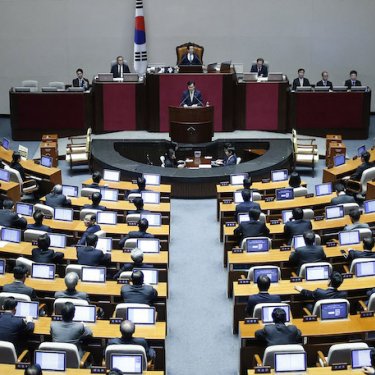South Korea: RSF calls on legislators to reject anti-disinformation amendment which poses a threat to journalism

Reporters Without Borders (RSF) calls on South Korea’s legislators to refrain from adopting an anti-disinformation amendment which, in its current form, could be instrumentalised against the media.
-----------------------------------------------------------------------------------------
Update - 31st August 2021
The vote on the amendment to the Press Arbitration Act has been delayed to 27th of September 2021.
-----------------------------------------------------------------------------------------
On Wednesday 25th of August, South Korea's Democratic Party, which holds a large majority at the National Assembly, will submit to vote an amendment to the Press Arbitration Act that will toughen civil penalties on media outlets held responsible for making “false” or “fabricated ”News reports. A coalition of seven media organizations, including the Journalists Association of Korea (JAK), a partner of RSF, called for the retractation of the proposed amendment, arguing that the definition of “false” or “fabricated” reporting is unclear.
The revised Press Arbitration Act would increase legal liability for the release of false news written with “intention” or “gross negligence” with a penalty of up to five times the alleged damage caused by reporting. It does neither include a detailed definition of the offense nor defines the system that proves the falsehood of the reporting and evidence of the perpetrator's intention. In response to criticism, the ruling party recently revised the bill so that high-ranking government officials and major companies' executives cannot seek punitive damage and that individual reporters are kept exempt from damage claims.
“The proposed amendment could open the door to any arbitrary interpretation and possibly be instrumentalised to put pressure on the media,” says RSF East Asia Bureau head, Cédric Alviani, who calls on South Korea's legislators to refrain from adopting the bill. “ No matter the legitimacy of the fight against disinformation, legislators should never create new legal tools without ensuring they include sufficient guarantees, as court decisions can be very subjective on those sensitive issues.“
In order to address the growing presence of false and manipulated information online, RSF together with several other civil society organizations initiated the Forum on Information and Democracy , which published last year a set of 250 recommendations . The Journalism Trust Initiative (JTI), a mechanism to promote trustworthiness of news and information, is another project initiated by RSF and supported by the JAK in South Korea.
In September 2019, the secretary-general of RSF, Christophe Deloire, was received by South Korean President Moon Jae-in at the Blue House, the presidential office in Seoul.
In 2017, during a previous mission of RSF in South Korea, President Moon's administration pledged for the country to rank 30th in RSF's World Press Freedom Index by 2022.
South Korea ranks 42nd in the 2021 World Press Freedom Index published by RSF.



